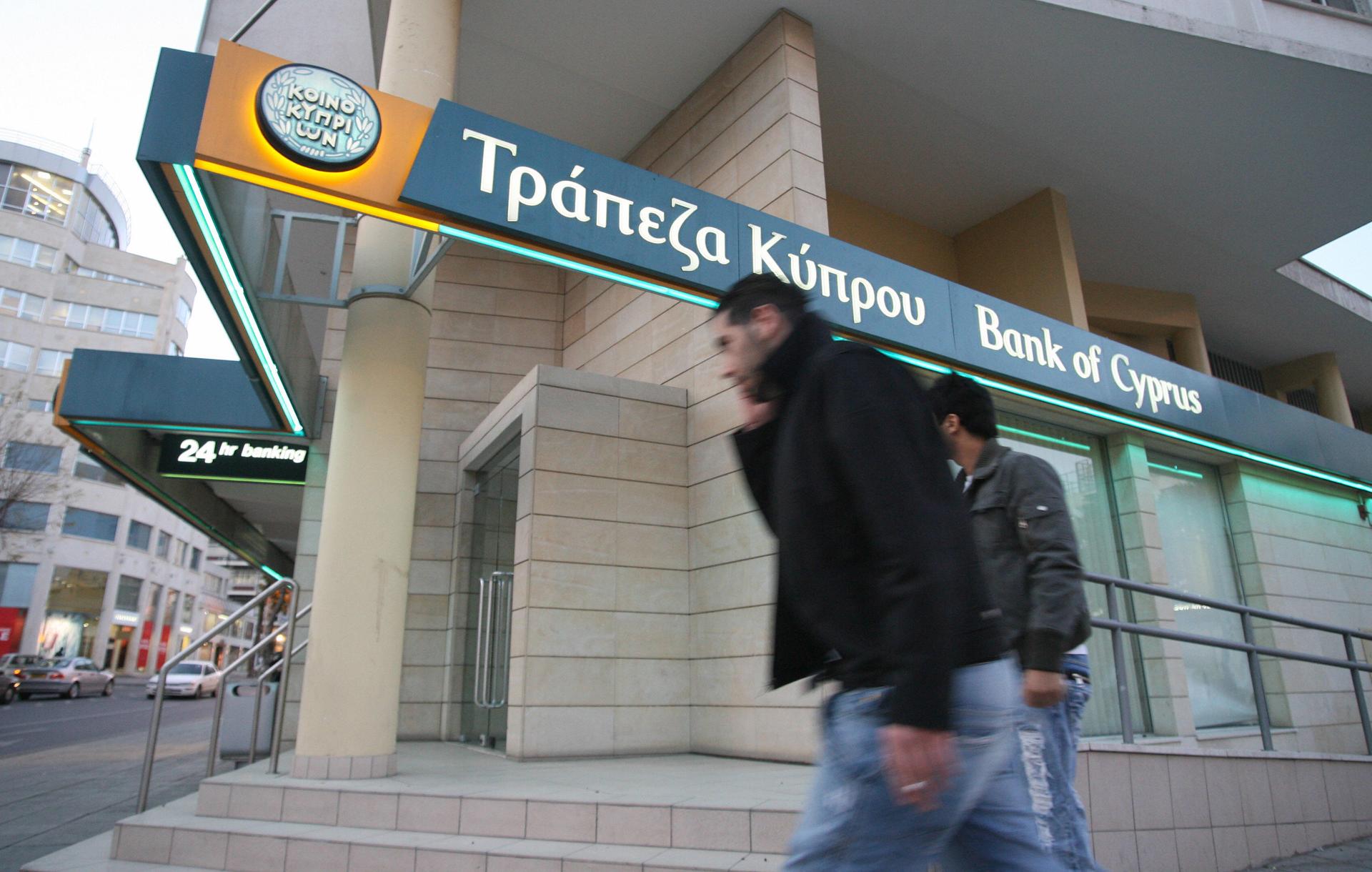Gold and other metal prices are plunging
Nicosia, CYPRUS: Two men walk past a Bank of Cyprus branch on Nicosia’s Makarios main thoroughfare.
BRUSSELS, Belgium — Gold is usually seen as a safe haven for investors in times of trouble, but it seems the euro crisis may have turned financial wisdom on its head again.
Gold futures plunged more than 9 percent on Monday, marking the biggest one-day percentage fall in 30 years and extending losses over the past two sessions to more than 13 percent, as the precious metal pushed deeper into bear market territory.
The June contract for gold settled at $1,361.10 an ounce on the Comex division of the New York Mercantile Exchange – $140.30 or 9.3 percent lower than the previous session's close.
MarketWatch said the dollar fall was the biggest since 1980 and the second largest in its history, and triggered sharp falls in gold producing stocks.
Gold has fallen more than 20 percent from the record high set in August 2011, which is the common definition of a bear market.
The news comes after leaked documents last week revealed that the European Commission advised Cyprus to sell off 400 million euro ($524 million) from its gold reserves, which spooked markets big time, triggering fears that other, bigger euro-zone debtors could also be pressured to dump their bullion on the market.
Stan Shamu, market strategist at IG Markets in Melbourne, said that gold's losing value can largely be blamed on fears stemming from that news.
“This is after ECB President Mario Draghi put pressure on Cyprus to sell its excess gold reserves to help fund the bailout and plug a 6 billion euro gap," he wrote in a note to investors that the Wall Street Journal obtained.
More from GlobalPost: Who will be the next Cyprus?
"Although Cyprus is yet to decide how it’ll fund the gap, these comments have rattled investors and caused the selloff," Shamu added.
The troubled states of southern Europe hold major gold stocks. Italy has the world's fourth largest reserves — worth around 95 billion euro ($125 billion). Spain, Portugal and Greece hold around 30 billion euro ($39 billion) more.
Putting some of that on the market could put a sizeable hole in their debts, but fear of a fire sale would also push down prices which is why, until last week's leaked EU plan for Cyprus, no one has been planning to sell.
The euro zone impact on the gold crisis has been compounded by other factors — fears of a Chinese economic slow down have hit a range of commodities, including gold.
On Monday, silver for May delivery dived 11 percent to $23.36 an ounce after China announced its economy grew 7.7 percent year-on-year in the first quarter, down from 7.9 percent in the fourth quarter of 2012.
There is also a growing view that the gold had risen to unrealistic levels, especially due to the lack of inflation risks in the world economy. Conversely increased confidence in the US economy many have persuaded some investors to switch from metal to shares.
Silver, platinum and copper prices have also tumbled. Of course, investors have predicted the economic collapse of gold for years, and many investors had long given up on gold and other precious metals, ABC News reported. Last week, Goldman Sachs also predicted gold prices would tumble.
Though Cyprus' gold sale by itself would not be significant, the potential sale has created fears that other indebted euro zone nations could also be under pressure to sell their reserves.
"If Cyprus can break the gold market, then [there are] many reasons to be worried, with Slovenia, Hungary, Portugal, Spain and Italy in line," Milko Markov, an investment analyst at SK Hart Management, told the Guardian.
Paul Ames contributed to this report from Brussels.
Every day, reporters and producers at The World are hard at work bringing you human-centered news from across the globe. But we can’t do it without you. We need your support to ensure we can continue this work for another year.
Make a gift today, and you’ll help us unlock a matching gift of $67,000!
